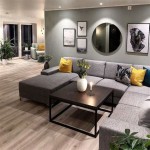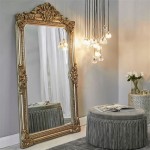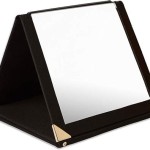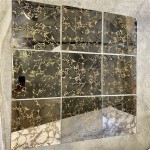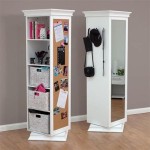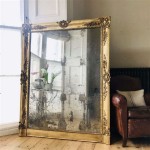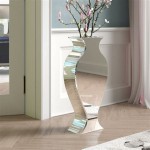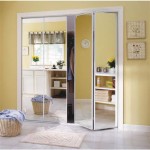Can You Put a Mirror in Front of Your Bed? Exploring the Practical and Symbolic Considerations
The placement of mirrors within a bedroom, and specifically the positioning of a mirror directly opposite a bed, is a topic often debated. The discussion encompasses both practical considerations, such as light reflection and spatial perception, and symbolic implications rooted in cultural beliefs and interior design principles. Deciding whether to place a mirror in front of a bed requires a careful evaluation of individual preferences, room layout, and an understanding of the potential effects on sleep quality and overall ambiance.
Mirrors are frequently utilized in interior design to enhance the visual appeal of a space. They can reflect natural light, making a room appear brighter and more spacious. In smaller bedrooms, this can be particularly beneficial, as a strategically placed mirror can create the illusion of greater square footage. Conversely, an improperly positioned mirror could amplify existing lighting issues, such as harsh glares or uneven illumination. Therefore, the decision to place a mirror in front of a bed should not be made without considering the room's existing light sources and how they might interact with the mirrored surface.
From a purely practical perspective, the type of mirror being considered is also relevant. A full-length mirror, often favored for its functionality in providing a complete view of one's attire, presents a different set of considerations than a smaller decorative mirror. The size of the mirror will directly impact the extent to which it reflects light and the overall impact on the room's aesthetics. The height and angle of the mirror are equally important, as these factors will determine what is reflected in the mirrored surface. A poorly angled mirror might reflect undesirable views, such as clutter or an unappealing part of the room, thereby negating any potential benefits.
Beyond the practical aspects, cultural beliefs and various design philosophies often influence decisions regarding mirror placement. In some cultures, specific mirror placements are believed to impact energy flow, sleep quality, and even personal relationships. These beliefs, though not scientifically verifiable, can play a significant role in an individual's comfort level and overall satisfaction with their bedroom environment.
Feng Shui Principles and Mirror Placement
Feng Shui, an ancient Chinese system of aesthetics believed to govern spatial arrangement and orientation in relation to the flow of energy (qi), offers specific guidance on mirror placement, particularly in bedrooms. According to Feng Shui principles, placing a mirror directly facing a bed can disrupt sleep and create feelings of unease. This is because the mirror is believed to reflect and redirect energy, potentially interfering with the restful and restorative qualities of sleep.
The rationale behind this belief is that a mirror facing the bed can "activate" the energy of the sleeping person, preventing them from achieving a state of deep relaxation. It is suggested that the reflection can cause subconscious restlessness, leading to fragmented sleep and a feeling of being constantly on alert. Some practitioners believe that the mirror can also drain energy from the individual during the night, leaving them feeling fatigued and depleted in the morning.
Furthermore, in Feng Shui, mirrors are often associated with water, which is considered a powerful element with both positive and negative attributes. Placing a mirror in front of a bed is believed to create an imbalance in the water element, potentially leading to emotional instability and disharmony within the relationship of those sharing the bed. This is particularly relevant for couples, as the reflected image is thought to symbolize a third party interfering in the relationship.
However, it is important to acknowledge that Feng Shui is a complex system with nuanced interpretations. Some practitioners might suggest alternative mirror placements that mitigate the perceived negative effects, such as positioning the mirror on a side wall or using drapes or screens to cover the mirror when not in use. Ultimately, the application of Feng Shui principles is a matter of personal interpretation and should be approached with an understanding of the underlying rationale and a willingness to adapt the guidelines to individual circumstances.
Psychological Implications of Bedroom Mirrors
Beyond cultural beliefs, the presence of a mirror in a bedroom can also have psychological implications. Some individuals find the reflection of themselves, especially at night or when waking up, to be unsettling or distracting. This can contribute to feelings of self-consciousness or anxiety, particularly if the individual is already prone to body image concerns or struggles with self-esteem.
The reflection can also serve as a constant reminder of imperfections or perceived flaws, potentially amplifying negative thoughts and emotions. This is particularly relevant in a space that is intended for relaxation and rejuvenation. The bedroom should ideally be a sanctuary, free from stressors and distractions that can hinder restful sleep and overall well-being. A mirror that triggers negative self-perception can be counterproductive to this goal.
Conversely, for some individuals, a mirror in the bedroom can be a source of empowerment and self-affirmation. Seeing one's reflection can boost confidence and promote a positive body image. This is particularly true if the individual associates the bedroom with self-care routines and activities that enhance their sense of well-being. In such cases, a strategically placed mirror can serve as a reminder to prioritize self-love and acceptance.
The psychological impact of a bedroom mirror is highly subjective and depends on individual personality traits, self-perception, and past experiences. It is essential to be mindful of how the mirror makes one feel and to adjust its placement or presence accordingly. If the mirror consistently triggers negative emotions or interferes with sleep quality, it might be best to relocate it to another room or remove it altogether.
Alternative Mirror Placements and Design Considerations
If the desire is to incorporate a mirror into the bedroom design but concerns exist regarding placement opposite the bed, several alternative options can be explored. Positioning the mirror on a side wall, away from the direct line of sight from the bed, is a common solution. This allows for the benefits of light reflection and spatial enhancement without the potential disruptions associated with having a mirror directly in front of the sleeping space.
Another alternative is to integrate mirrors into furniture, such as mirrored closet doors or a dressing table with a built-in mirror. This can provide the functionality of a mirror without dominating the room's visual landscape. The size and shape of the mirror should also be carefully considered. A large, expansive mirror can create a dramatic effect, while smaller, decorative mirrors can add subtle accents and visual interest.
When selecting a mirror for the bedroom, it is important to consider the overall design aesthetic of the room. The mirror's frame, style, and finish should complement the existing furniture, décor, and color scheme. A mirror with an ornate frame can add a touch of elegance and sophistication, while a frameless mirror can create a more minimalist and modern look. The mirror's shape should also be chosen to enhance the room's proportions and visual appeal. A tall, narrow mirror can elongate the appearance of a low-ceilinged room, while a round mirror can soften the sharp angles of a square room.
Ultimately, the decision of whether or not to place a mirror in front of a bed is a personal one that should be based on a careful consideration of practical factors, cultural beliefs, psychological implications, and individual preferences. It is essential to experiment with different placements and designs to find what works best for the individual and creates a bedroom environment that is conducive to restful sleep, relaxation, and overall well-being. A thoughtful and informed approach to mirror placement can transform a bedroom into a harmonious and inviting space.

Why Having Your Mirror Facing Bed Is Bad Feng Shui

Why Having Your Mirror Facing Bed Is Bad Feng Shui

5 Reasons Why You Should Never Put A Mirror Facing The Bed Melanie Jade Design

5 Reasons Why You Should Never Put A Mirror Facing The Bed Melanie Jade Design

Where Should Mirrors Be Placed In A Bedroom For Feng Shui

Vastu Tips For Mirror Placement In Bedrooms

Mirror Facing Bed Feng Shui Tips Buy Fengshui Com

Should You Have A Mirror In Your Bedroom Why Feng Shui Experts Warn Against It Storables

Glamorous Mirrors Bringing Chic Into Modern Bedroom Designs Home Design Inspirations

5 Reasons Why You Should Never Put A Mirror Facing The Bed Melanie Jade Design

